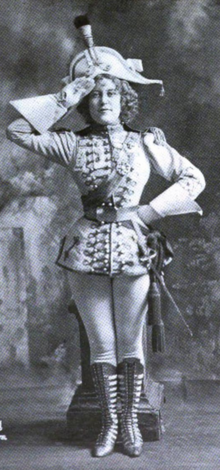Clarisse Agnew
Clarisse Agnew | |
|---|---|
 Clarisse Agnew, from an 1898 publication | |
| Born | Clarice Robinson 1876 Belvedere, Marin County, California |
| Died | November 29, 1904 Irvington, New York |
| Other names | Clarisse Reid, Clarissa Agnew |
| Occupation | Actress |
| Spouse | Daniel G. Reid |
Clarisse Agnew (1876 – November 29, 1904), born Clarice Adele Robinson, was an American actress and chorus girl. She appeared on Broadway in the 1890s, and was the second wife of industrialist Daniel G. Reid.
Early life
[edit]Clarice Robinson was born in Belvedere, in Marin County, California, the daughter of M. A. Robinson;[1] her father was a hotelkeeper.[2] Her stage career began in San Francisco when she was a teenager, but she soon moved to New York.[3]
Career
[edit]Agnew appeared as a "saucy and graceful soubrette"[4] toured nationally in Charles H. Hoyt's shows A Milk White Flag[5][6] and A Day and a Night in New York,[7] and performed with Ethel Barrymore in Cousin Kate.[8] Fellow actress Belle Livingstone recalled her as "the gayest of comediennes".[9] She was photographed with a bicycle for an 1897 magazine feature on American actresses and cycling.[10] Her marriage in 1900 was seen as part of a trend of showgirls finding wealthy husbands.[11][12]
Personal life
[edit]Agnew was named as a co-respondent in a divorce case in 1900.[13][14] She married wealthy widower Daniel G. Reid in 1900.[15] She died in 1904, in Irvington, New York,[2] from complications during surgery "for the removal of a tumor".[16] She was 27 years old.[17]
References
[edit]- ^ "Mystery Lurks in Five Line Special". The San Francisco Examiner. 1910-03-28. p. 2. Retrieved 2022-08-10 – via Newspapers.com.
- ^ a b "Former California Actress Passes Away". The San Francisco Examiner. 1904-11-30. p. 7. Retrieved 2022-08-10 – via Newspapers.com.
- ^ "She Married a Millionaire and Now is a Co-Respondent". The San Francisco Examiner. 1900-12-03. p. 2. Retrieved 2022-08-10 – via Newspapers.com.
- ^ "Drama's Day Now Dawns". The Chicago Chronicle. 1896-09-06. p. 18. Retrieved 2022-08-10 – via Newspapers.com.
- ^ Briscoe, Johnson (July 1911). "Tempus Fugit in the Theatre". The Green Book Album. 6: 147–148.
- ^ "She Proved Her Identity; How Clairisse Agnew Almost Shocked Mr. Dorney". Times Union. 1897-01-25. p. 3. Retrieved 2022-08-10 – via Newspapers.com.
- ^ Catalogue of Plays, 1916. Sanger & Jordan. 1916. p. 62.
- ^ "Cousin Kate". The Cast. 14 (187): 324. December 28, 1903.
- ^ Livingstone, Belle (1927). Belle of Bohemia: The Memoirs of Belle Livingstone. J. Hamilton Limited. p. 61.
- ^ "A Favorite American Pastime". The Peterson Magazine. 7: 318. March 1897.
- ^ "From Tights to Millions". The Pandex of the Press. 2 (4): 373. October 1905.
- ^ ten Broeck, Helen (May 1920). "Society and the Stage". Theatre Magazine. 31: 406.
- ^ Weil v. Weil, New York Supreme Court (March 6, 1900): 679.
- ^ "Mrs. Weil Quickly Gets Divorce". The San Francisco Examiner. 1900-12-07. p. 9. Retrieved 2022-08-10 – via Newspapers.com.
- ^ "Clipped From The Atlanta Constitution". The Atlanta Constitution. 1920-08-15. p. 3. Retrieved 2022-08-10 – via Newspapers.com.
- ^ "Clarisse Agnew Died After an Operation". The Fresno Morning Republican. 1904-11-30. p. 8. Retrieved 2022-08-10 – via Newspapers.com.
- ^ "The Deaths of the Week". The Week's Progress. 24: 513. December 10, 1904.
